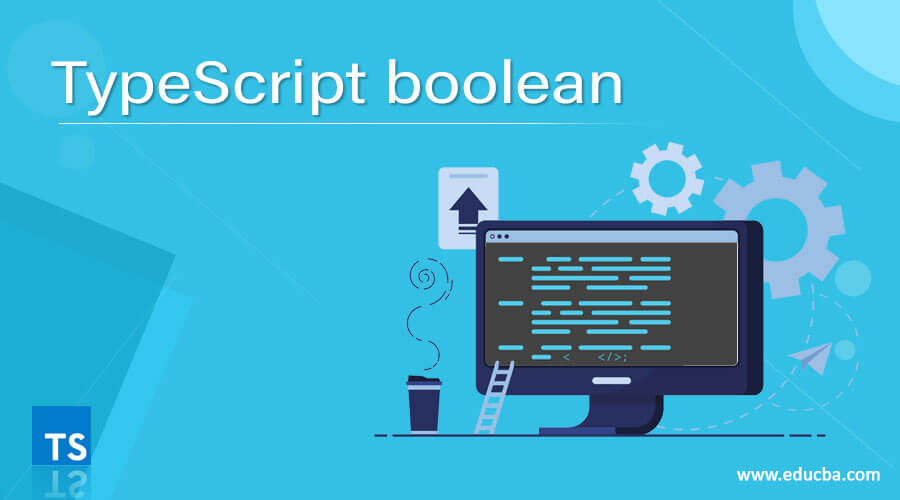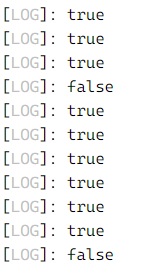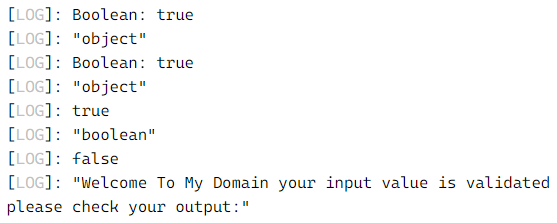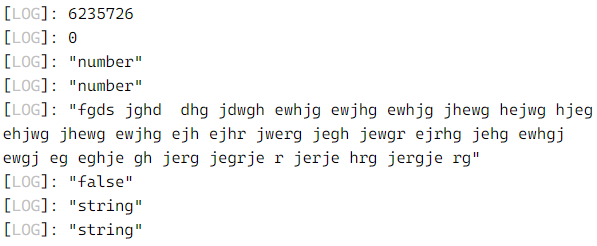Updated April 3, 2023

Introduction to TypeScript boolean
Typescript Boolean is one of the primitive data types and it is used to denote only the true or false value. They are implemented by using the numerical values with binary digits representations it accepts 0 and 1. Generally the boolean is one of the object wrappers for the primitive data type boolean values they have some differences for both boolean object and boolean primitive data types. The boolean accept and act like the global function in which we want to convert any data type values to boolean primitive data type like boolean to string and string to boolean.
Syntax:
The typescript boolean is the default and pre-defined primitive data type that can be accepted only true or false, 0 or 1 boolean type of values. Generally, the Typescript accepts and performed the boolean actions using 0 or 1 numbers and also the script accepts other data types which is imported using the typescript languages.
var or let variable name: boolean;
variable name = true or false;
---some type script code logics depends upon the requirement---The above codes are the basic syntax for using the boolean data type in the script. We can use true or false, 0 or 1, yes or no even null values are also accepted in the boolean variable reference.
How boolean type work in TypeScript?
We can use the boolean keyword for declaring the boolean type of values in the variables. When we want to enable the isPresent:boolean = true is like the property with which can enable the boolean type of values used in the script. The boolean data type is one of the case-sensitive and has been different from upper case to lower case alphabets. In typescript, the boolean variable will be created two different ways 1. The first thing is normally assigning the variable reference using the boolean type and another choice is 2. We can declare the variable globally and then we call it in the boolean function so globally we can use the boolean data type values in anywhere of the Typescripting areas. By using the Boolean() function it’s a global one and it is used to convert its parameters to the primitive boolean values and it will return the same as the return type. We can pass any type of values as the arguments in the boolean function but it always likes to convert its values to either true or false the specific value will convert to true or false which depends upon the user input value must be truly one or not. And also meanwhile boolean acts as the object and it is a wrapper around with the boolean primitive datatype. So whenever we want to create a boolean object the typescript code must have the constructor.
Examples of TypeScript boolean
Here are the following examples mentioned below.
Example #1
Code:
let vars:boolean
vars=Boolean(true)
console.log(vars)
vars=Boolean("hasdgvh wgedb jhwejwh jwhe54 whge wheg gehdge wehg hwgej wejhg wjehg wjhg wjegh wjeh wejh wejhg476 we wgejweg weghekwjrg jhegjewh gk jkerhje whrk hjekgkj3ehgjkehjewkhkj hj hhej jhew jhej jhejhj")
console.log(vars)
vars=Boolean("5234x152x5214x 25 52 245 245 2r5 25 253 2536 2532 356 532 5236 5326532 6 253 5326 35 3553 254 534 532 35365 563 365 3535 6 536 6536 356 356 3656 356 5365 36 536 653 653 63 365 635 3564 354 354 3554")
console.log(vars)
vars=Boolean(false)
console.log(vars)
vars=Boolean(52163365214)
console.log(vars)
vars=Boolean({})
console.log(vars)
let vars1= { name:'wyteyrf wgef whfewg hewf hge jhewgj hewg jheg hjwegjh ewg jhewgj ewg jg jegj g3ej e3gj gej egj egj 3eg jgerj 3gr3u4 gi3 u4g j34ug j43grje hrf ejghje r'}
vars=Boolean(vars1)
console.log(vars)
vars=Boolean([])
console.log(vars)
vars=Boolean(new Date())
console.log(vars)
vars=Boolean(Infinity)
console.log(vars)
vars=Boolean(null)
console.log(vars)Output:
In the above example, we used the Boolean() function and it is to be assigned with the variables with var or let datatype. We can use any type of values like numeric or non-numeric digits but when we want to validate the values then it returns the true or false based on the input validations from the backend. In the above scenario, we used all the types of input values but it returns only the true or false so it will validate the boolean conditions also we used the boolean function in the script. Additionally, we added the date class object to be stored as the separate variable reference it also validated the date conditions in the backend and it returns the true so it was satisfying and passed the boolean conditions.
Example #2
Code:
let vars=new Boolean("fs hfsa hasf afgs sga asf ahsf ahshf hasg hasga hsgha sga ghs ahg jagshj agsj ags")
console.log(vars)
console.log(typeof(vars))
let vars2=new Boolean("ffs h3fsa ha2sf af23gs 6235 3847 asf ahsf ahshf 746hasg hasga hsgha sga ghs ahg jagshj agsj ags")
console.log(vars2)
console.log(typeof(vars2))
console.log(vars.valueOf())
console.log(typeof(vars.valueOf()))
var vars1 = new Boolean(false);
console.log(vars1.valueOf())
if (vars1) {
console.log("Welcome To My Domain your input value is validated please check your output:");
}Output:
In the second example, we used the boolean primitive type in different ways is we used typeof() and valueof() methods it will return the primitive boolean values are back on the script. We also create the instance of the boolean class and it has the default argument as the value like “false” and it will print that the variable reference with calling the valueof() method.s By using if the condition it will validate the values and print them on the output console.
Example #3
Code:
let vars=Number(6235726)
let vars1=Number(false)
console.log(vars);
console.log(vars1);
console.log(typeof(vars))
console.log(typeof(vars1))
let vars2=String("fgds jghd dhg jdwgh ewhjg ewjhg ewhjg jhewg hejwg hjeg ehjwg jhewg ewjhg ejh ejhr jwerg jegh jewgr ejrhg jehg ewhgj ewgj eg eghje gh jerg jegrje r jerje hrg jergje rg");
let vars3=String(false);
console.log(vars2)
console.log(vars3)
console.log(typeof(vars2))
console.log(typeof(vars3))Output:
In the final example, we used some value conversions like boolean to numbers and boolean to strings. We can use default methods like Numbers(), String(), and typeof() to validate the input conditions and also convert the values from one type to another type.
Conclusion
Generally the boolean is one of the primitive types in Typescript and also it has the boolean object for calling the default methods wherever it’s needed on the application. Additionally, we want to convert the boolean type to other data types, and also it accepts the null values as the arguments in the function.
Recommended Articles
This is a guide to TypeScript boolean. Here we discuss How boolean types work in TypeScript and Examples along with the codes and outputs. You may also have a look at the following articles to learn more –



